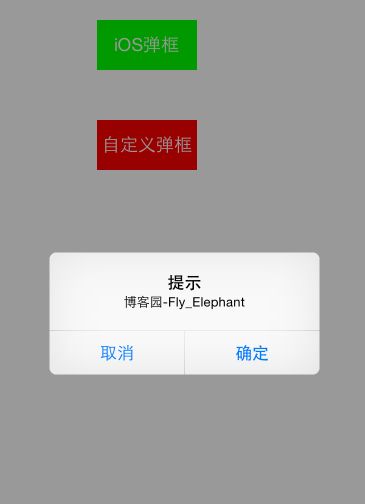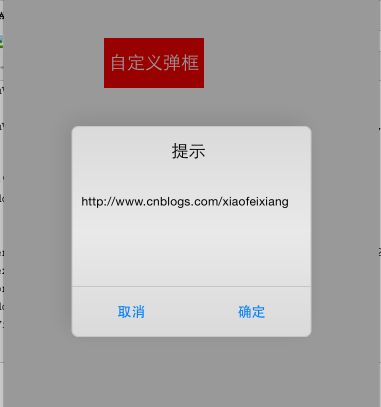iOS开发-自定义UIAlterView(iOS 7)
App中不可能少了弹框,弹框是交互的必要形式,使用起来也非常简单,不过最近需要自定义一个弹框,虽然iOS本身的弹框已经能满足大部分的需求,但是不可避免还是需要做一些自定义的工作。iOS7之前是可以自定义AlterView的,就是继承一下UIAlterView,然后初始化的时候通过addSubview添加自定义的View,但是iOS7之后这样做就不行了,不过还好有开源项目可以解决这个问题。
iOS默认弹框
viewDidLoad中添加两个按钮,代码如下:
UIButton *orignalBtn=[[UIButton alloc]initWithFrame:CGRectMake(100, 40, 100, 50)];
[orignalBtn setBackgroundColor:[UIColor greenColor]];
[orignalBtn setTitle:@"iOS弹框" forState:UIControlStateNormal];
[orignalBtn addTarget:self action:@selector(orignalShow) forControlEvents:UIControlEventTouchUpInside];
[self.view addSubview:orignalBtn];
UIButton *customlBtn=[[UIButton alloc]initWithFrame:CGRectMake(100, 140, 100, 50)];
[customlBtn setBackgroundColor:[UIColor redColor]];
[customlBtn setTitle:@"自定义弹框" forState:UIControlStateNormal];
[customlBtn addTarget:self action:@selector(customShow) forControlEvents:UIControlEventTouchUpInside];
[self.view addSubview:customlBtn];
响应默认弹框事件:
-(void)orignalShow{
UIAlertView *alterView=[[UIAlertView alloc]initWithTitle:@"提示" message:@"博客园-Fly_Elephant" delegate:self cancelButtonTitle:@"取消" otherButtonTitles:@"确定", nil];
[alterView show];
}
效果如下:

自定义弹框
主要解决iOS7之后的系统无法自定义弹框的问题,使用开源项目,项目地址:https://github.com/wimagguc/ios-custom-alertview,其实就是自定义了一个类:
CustomIOSAlertView.h
#import <UIKit/UIKit.h> @protocol CustomIOSAlertViewDelegate - (void)customIOS7dialogButtonTouchUpInside:(id)alertView clickedButtonAtIndex:(NSInteger)buttonIndex; @end @interface CustomIOSAlertView : UIView<CustomIOSAlertViewDelegate> @property (nonatomic, retain) UIView *parentView; // The parent view this 'dialog' is attached to @property (nonatomic, retain) UIView *dialogView; // Dialog's container view @property (nonatomic, retain) UIView *containerView; // Container within the dialog (place your ui elements here) @property (nonatomic, assign) id<CustomIOSAlertViewDelegate> delegate; @property (nonatomic, retain) NSArray *buttonTitles; @property (nonatomic, assign) BOOL useMotionEffects; @property (copy) void (^onButtonTouchUpInside)(CustomIOSAlertView *alertView, int buttonIndex) ; - (id)init; /*! DEPRECATED: Use the [CustomIOSAlertView init] method without passing a parent view. */ - (id)initWithParentView: (UIView *)_parentView __attribute__ ((deprecated)); - (void)show; - (void)close; - (IBAction)customIOS7dialogButtonTouchUpInside:(id)sender; - (void)setOnButtonTouchUpInside:(void (^)(CustomIOSAlertView *alertView, int buttonIndex))onButtonTouchUpInside; - (void)deviceOrientationDidChange: (NSNotification *)notification; - (void)dealloc; @end
CustomIOSAlertView.m
#import "CustomIOSAlertView.h"
#import <QuartzCore/QuartzCore.h>
const static CGFloat kCustomIOSAlertViewDefaultButtonHeight = 50;
const static CGFloat kCustomIOSAlertViewDefaultButtonSpacerHeight = 1;
const static CGFloat kCustomIOSAlertViewCornerRadius = 7;
const static CGFloat kCustomIOS7MotionEffectExtent = 10.0;
@implementation CustomIOSAlertView
CGFloat buttonHeight = 0;
CGFloat buttonSpacerHeight = 0;
@synthesize parentView, containerView, dialogView, onButtonTouchUpInside;
@synthesize delegate;
@synthesize buttonTitles;
@synthesize useMotionEffects;
- (id)initWithParentView: (UIView *)_parentView
{
self = [self init];
if (_parentView) {
self.frame = _parentView.frame;
self.parentView = _parentView;
}
return self;
}
- (id)init
{
self = [super init];
if (self) {
self.frame = CGRectMake(0, 0, [UIScreen mainScreen].bounds.size.width, [UIScreen mainScreen].bounds.size.height);
delegate = self;
useMotionEffects = false;
buttonTitles = @[@"Close"];
[[UIDevice currentDevice] beginGeneratingDeviceOrientationNotifications];
[[NSNotificationCenter defaultCenter] addObserver:self selector:@selector(deviceOrientationDidChange:) name:UIDeviceOrientationDidChangeNotification object:nil];
[[NSNotificationCenter defaultCenter] addObserver:self selector:@selector(keyboardWillShow:) name:UIKeyboardWillShowNotification object:nil];
[[NSNotificationCenter defaultCenter] addObserver:self selector:@selector(keyboardWillHide:) name:UIKeyboardWillHideNotification object:nil];
}
return self;
}
// Create the dialog view, and animate opening the dialog
- (void)show
{
dialogView = [self createContainerView];
dialogView.layer.shouldRasterize = YES;
dialogView.layer.rasterizationScale = [[UIScreen mainScreen] scale];
self.layer.shouldRasterize = YES;
self.layer.rasterizationScale = [[UIScreen mainScreen] scale];
#if (defined(__IPHONE_7_0))
if (useMotionEffects) {
[self applyMotionEffects];
}
#endif
self.backgroundColor = [UIColor colorWithRed:0 green:0 blue:0 alpha:0];
[self addSubview:dialogView];
// Can be attached to a view or to the top most window
// Attached to a view:
if (parentView != NULL) {
[parentView addSubview:self];
// Attached to the top most window
} else {
// On iOS7, calculate with orientation
if (floor(NSFoundationVersionNumber) <= NSFoundationVersionNumber_iOS_7_1) {
UIInterfaceOrientation interfaceOrientation = [[UIApplication sharedApplication] statusBarOrientation];
switch (interfaceOrientation) {
case UIInterfaceOrientationLandscapeLeft:
self.transform = CGAffineTransformMakeRotation(M_PI * 270.0 / 180.0);
break;
case UIInterfaceOrientationLandscapeRight:
self.transform = CGAffineTransformMakeRotation(M_PI * 90.0 / 180.0);
break;
case UIInterfaceOrientationPortraitUpsideDown:
self.transform = CGAffineTransformMakeRotation(M_PI * 180.0 / 180.0);
break;
default:
break;
}
[self setFrame:CGRectMake(0, 0, self.frame.size.width, self.frame.size.height)];
// On iOS8, just place the dialog in the middle
} else {
CGSize screenSize = [self countScreenSize];
CGSize dialogSize = [self countDialogSize];
CGSize keyboardSize = CGSizeMake(0, 0);
dialogView.frame = CGRectMake((screenSize.width - dialogSize.width) / 2, (screenSize.height - keyboardSize.height - dialogSize.height) / 2, dialogSize.width, dialogSize.height);
}
[[[[UIApplication sharedApplication] windows] firstObject] addSubview:self];
}
dialogView.layer.opacity = 0.5f;
dialogView.layer.transform = CATransform3DMakeScale(1.3f, 1.3f, 1.0);
[UIView animateWithDuration:0.2f delay:0.0 options:UIViewAnimationOptionCurveEaseInOut
animations:^{
self.backgroundColor = [UIColor colorWithRed:0 green:0 blue:0 alpha:0.4f];
dialogView.layer.opacity = 1.0f;
dialogView.layer.transform = CATransform3DMakeScale(1, 1, 1);
}
completion:NULL
];
}
// Button has been touched
- (IBAction)customIOS7dialogButtonTouchUpInside:(id)sender
{
if (delegate != NULL) {
[delegate customIOS7dialogButtonTouchUpInside:self clickedButtonAtIndex:[sender tag]];
}
if (onButtonTouchUpInside != NULL) {
onButtonTouchUpInside(self, (int)[sender tag]);
}
}
// Default button behaviour
- (void)customIOS7dialogButtonTouchUpInside: (CustomIOSAlertView *)alertView clickedButtonAtIndex:(NSInteger)buttonIndex
{
NSLog(@"Button Clicked! %d, %d", (int)buttonIndex, (int)[alertView tag]);
[self close];
}
// Dialog close animation then cleaning and removing the view from the parent
- (void)close
{
CATransform3D currentTransform = dialogView.layer.transform;
if (floor(NSFoundationVersionNumber) <= NSFoundationVersionNumber_iOS_7_1) {
CGFloat startRotation = [[dialogView valueForKeyPath:@"layer.transform.rotation.z"] floatValue];
CATransform3D rotation = CATransform3DMakeRotation(-startRotation + M_PI * 270.0 / 180.0, 0.0f, 0.0f, 0.0f);
dialogView.layer.transform = CATransform3DConcat(rotation, CATransform3DMakeScale(1, 1, 1));
}
dialogView.layer.opacity = 1.0f;
[UIView animateWithDuration:0.2f delay:0.0 options:UIViewAnimationOptionTransitionNone
animations:^{
self.backgroundColor = [UIColor colorWithRed:0.0f green:0.0f blue:0.0f alpha:0.0f];
dialogView.layer.transform = CATransform3DConcat(currentTransform, CATransform3DMakeScale(0.6f, 0.6f, 1.0));
dialogView.layer.opacity = 0.0f;
}
completion:^(BOOL finished) {
for (UIView *v in [self subviews]) {
[v removeFromSuperview];
}
[self removeFromSuperview];
}
];
}
- (void)setSubView: (UIView *)subView
{
containerView = subView;
}
// Creates the container view here: create the dialog, then add the custom content and buttons
- (UIView *)createContainerView
{
if (containerView == NULL) {
containerView = [[UIView alloc] initWithFrame:CGRectMake(0, 0, 300, 150)];
}
CGSize screenSize = [self countScreenSize];
CGSize dialogSize = [self countDialogSize];
// For the black background
[self setFrame:CGRectMake(0, 0, screenSize.width, screenSize.height)];
// This is the dialog's container; we attach the custom content and the buttons to this one
UIView *dialogContainer = [[UIView alloc] initWithFrame:CGRectMake((screenSize.width - dialogSize.width) / 2, (screenSize.height - dialogSize.height) / 2, dialogSize.width, dialogSize.height)];
// First, we style the dialog to match the iOS7 UIAlertView >>>
CAGradientLayer *gradient = [CAGradientLayer layer];
gradient.frame = dialogContainer.bounds;
gradient.colors = [NSArray arrayWithObjects:
(id)[[UIColor colorWithRed:218.0/255.0 green:218.0/255.0 blue:218.0/255.0 alpha:1.0f] CGColor],
(id)[[UIColor colorWithRed:233.0/255.0 green:233.0/255.0 blue:233.0/255.0 alpha:1.0f] CGColor],
(id)[[UIColor colorWithRed:218.0/255.0 green:218.0/255.0 blue:218.0/255.0 alpha:1.0f] CGColor],
nil];
CGFloat cornerRadius = kCustomIOSAlertViewCornerRadius;
gradient.cornerRadius = cornerRadius;
[dialogContainer.layer insertSublayer:gradient atIndex:0];
dialogContainer.layer.cornerRadius = cornerRadius;
dialogContainer.layer.borderColor = [[UIColor colorWithRed:198.0/255.0 green:198.0/255.0 blue:198.0/255.0 alpha:1.0f] CGColor];
dialogContainer.layer.borderWidth = 1;
dialogContainer.layer.shadowRadius = cornerRadius + 5;
dialogContainer.layer.shadowOpacity = 0.1f;
dialogContainer.layer.shadowOffset = CGSizeMake(0 - (cornerRadius+5)/2, 0 - (cornerRadius+5)/2);
dialogContainer.layer.shadowColor = [UIColor blackColor].CGColor;
dialogContainer.layer.shadowPath = [UIBezierPath bezierPathWithRoundedRect:dialogContainer.bounds cornerRadius:dialogContainer.layer.cornerRadius].CGPath;
// There is a line above the button
UIView *lineView = [[UIView alloc] initWithFrame:CGRectMake(0, dialogContainer.bounds.size.height - buttonHeight - buttonSpacerHeight, dialogContainer.bounds.size.width, buttonSpacerHeight)];
lineView.backgroundColor = [UIColor colorWithRed:198.0/255.0 green:198.0/255.0 blue:198.0/255.0 alpha:1.0f];
[dialogContainer addSubview:lineView];
// ^^^
// Add the custom container if there is any
[dialogContainer addSubview:containerView];
// Add the buttons too
[self addButtonsToView:dialogContainer];
return dialogContainer;
}
// Helper function: add buttons to container
- (void)addButtonsToView: (UIView *)container
{
if (buttonTitles==NULL) { return; }
CGFloat buttonWidth = container.bounds.size.width / [buttonTitles count];
for (int i=0; i<[buttonTitles count]; i++) {
UIButton *closeButton = [UIButton buttonWithType:UIButtonTypeCustom];
[closeButton setFrame:CGRectMake(i * buttonWidth, container.bounds.size.height - buttonHeight, buttonWidth, buttonHeight)];
[closeButton addTarget:self action:@selector(customIOS7dialogButtonTouchUpInside:) forControlEvents:UIControlEventTouchUpInside];
[closeButton setTag:i];
[closeButton setTitle:[buttonTitles objectAtIndex:i] forState:UIControlStateNormal];
[closeButton setTitleColor:[UIColor colorWithRed:0.0f green:0.5f blue:1.0f alpha:1.0f] forState:UIControlStateNormal];
[closeButton setTitleColor:[UIColor colorWithRed:0.2f green:0.2f blue:0.2f alpha:0.5f] forState:UIControlStateHighlighted];
[closeButton.titleLabel setFont:[UIFont boldSystemFontOfSize:14.0f]];
[closeButton.layer setCornerRadius:kCustomIOSAlertViewCornerRadius];
[container addSubview:closeButton];
}
}
// Helper function: count and return the dialog's size
- (CGSize)countDialogSize
{
CGFloat dialogWidth = containerView.frame.size.width;
CGFloat dialogHeight = containerView.frame.size.height + buttonHeight + buttonSpacerHeight;
return CGSizeMake(dialogWidth, dialogHeight);
}
// Helper function: count and return the screen's size
- (CGSize)countScreenSize
{
if (buttonTitles!=NULL && [buttonTitles count] > 0) {
buttonHeight = kCustomIOSAlertViewDefaultButtonHeight;
buttonSpacerHeight = kCustomIOSAlertViewDefaultButtonSpacerHeight;
} else {
buttonHeight = 0;
buttonSpacerHeight = 0;
}
CGFloat screenWidth = [UIScreen mainScreen].bounds.size.width;
CGFloat screenHeight = [UIScreen mainScreen].bounds.size.height;
// On iOS7, screen width and height doesn't automatically follow orientation
if (floor(NSFoundationVersionNumber) <= NSFoundationVersionNumber_iOS_7_1) {
UIInterfaceOrientation interfaceOrientation = [[UIApplication sharedApplication] statusBarOrientation];
if (UIInterfaceOrientationIsLandscape(interfaceOrientation)) {
CGFloat tmp = screenWidth;
screenWidth = screenHeight;
screenHeight = tmp;
}
}
return CGSizeMake(screenWidth, screenHeight);
}
#if (defined(__IPHONE_7_0))
// Add motion effects
- (void)applyMotionEffects {
if (floor(NSFoundationVersionNumber) <= NSFoundationVersionNumber_iOS_6_1) {
return;
}
UIInterpolatingMotionEffect *horizontalEffect = [[UIInterpolatingMotionEffect alloc] initWithKeyPath:@"center.x"
type:UIInterpolatingMotionEffectTypeTiltAlongHorizontalAxis];
horizontalEffect.minimumRelativeValue = @(-kCustomIOS7MotionEffectExtent);
horizontalEffect.maximumRelativeValue = @( kCustomIOS7MotionEffectExtent);
UIInterpolatingMotionEffect *verticalEffect = [[UIInterpolatingMotionEffect alloc] initWithKeyPath:@"center.y"
type:UIInterpolatingMotionEffectTypeTiltAlongVerticalAxis];
verticalEffect.minimumRelativeValue = @(-kCustomIOS7MotionEffectExtent);
verticalEffect.maximumRelativeValue = @( kCustomIOS7MotionEffectExtent);
UIMotionEffectGroup *motionEffectGroup = [[UIMotionEffectGroup alloc] init];
motionEffectGroup.motionEffects = @[horizontalEffect, verticalEffect];
[dialogView addMotionEffect:motionEffectGroup];
}
#endif
- (void)dealloc
{
[[UIDevice currentDevice] endGeneratingDeviceOrientationNotifications];
[[NSNotificationCenter defaultCenter] removeObserver:self name:UIDeviceOrientationDidChangeNotification object:nil];
[[NSNotificationCenter defaultCenter] removeObserver:self name:UIKeyboardWillHideNotification object:nil];
[[NSNotificationCenter defaultCenter] removeObserver:self name:UIKeyboardWillShowNotification object:nil];
}
// Rotation changed, on iOS7
- (void)changeOrientationForIOS7 {
UIInterfaceOrientation interfaceOrientation = [[UIApplication sharedApplication] statusBarOrientation];
CGFloat startRotation = [[self valueForKeyPath:@"layer.transform.rotation.z"] floatValue];
CGAffineTransform rotation;
switch (interfaceOrientation) {
case UIInterfaceOrientationLandscapeLeft:
rotation = CGAffineTransformMakeRotation(-startRotation + M_PI * 270.0 / 180.0);
break;
case UIInterfaceOrientationLandscapeRight:
rotation = CGAffineTransformMakeRotation(-startRotation + M_PI * 90.0 / 180.0);
break;
case UIInterfaceOrientationPortraitUpsideDown:
rotation = CGAffineTransformMakeRotation(-startRotation + M_PI * 180.0 / 180.0);
break;
default:
rotation = CGAffineTransformMakeRotation(-startRotation + 0.0);
break;
}
[UIView animateWithDuration:0.2f delay:0.0 options:UIViewAnimationOptionTransitionNone
animations:^{
dialogView.transform = rotation;
}
completion:nil
];
}
// Rotation changed, on iOS8
- (void)changeOrientationForIOS8: (NSNotification *)notification {
CGFloat screenWidth = [UIScreen mainScreen].bounds.size.width;
CGFloat screenHeight = [UIScreen mainScreen].bounds.size.height;
[UIView animateWithDuration:0.2f delay:0.0 options:UIViewAnimationOptionTransitionNone
animations:^{
CGSize dialogSize = [self countDialogSize];
CGSize keyboardSize = [[[notification userInfo] objectForKey:UIKeyboardFrameBeginUserInfoKey] CGRectValue].size;
self.frame = CGRectMake(0, 0, screenWidth, screenHeight);
dialogView.frame = CGRectMake((screenWidth - dialogSize.width) / 2, (screenHeight - keyboardSize.height - dialogSize.height) / 2, dialogSize.width, dialogSize.height);
}
completion:nil
];
}
// Handle device orientation changes
- (void)deviceOrientationDidChange: (NSNotification *)notification
{
// If dialog is attached to the parent view, it probably wants to handle the orientation change itself
if (parentView != NULL) {
return;
}
if (floor(NSFoundationVersionNumber) <= NSFoundationVersionNumber_iOS_7_1) {
[self changeOrientationForIOS7];
} else {
[self changeOrientationForIOS8:notification];
}
}
// Handle keyboard show/hide changes
- (void)keyboardWillShow: (NSNotification *)notification
{
CGSize screenSize = [self countScreenSize];
CGSize dialogSize = [self countDialogSize];
CGSize keyboardSize = [[[notification userInfo] objectForKey:UIKeyboardFrameBeginUserInfoKey] CGRectValue].size;
UIInterfaceOrientation interfaceOrientation = [[UIApplication sharedApplication] statusBarOrientation];
if (UIInterfaceOrientationIsLandscape(interfaceOrientation)) {
CGFloat tmp = keyboardSize.height;
keyboardSize.height = keyboardSize.width;
keyboardSize.width = tmp;
}
[UIView animateWithDuration:0.2f delay:0.0 options:UIViewAnimationOptionTransitionNone
animations:^{
dialogView.frame = CGRectMake((screenSize.width - dialogSize.width) / 2, (screenSize.height - keyboardSize.height - dialogSize.height) / 2, dialogSize.width, dialogSize.height);
}
completion:nil
];
}
- (void)keyboardWillHide: (NSNotification *)notification
{
CGSize screenSize = [self countScreenSize];
CGSize dialogSize = [self countDialogSize];
[UIView animateWithDuration:0.2f delay:0.0 options:UIViewAnimationOptionTransitionNone
animations:^{
dialogView.frame = CGRectMake((screenSize.width - dialogSize.width) / 2, (screenSize.height - dialogSize.height) / 2, dialogSize.width, dialogSize.height);
}
completion:nil
];
}
@end
调用代码:
-(void)customShow{
CustomIOSAlertView *alertView = [[CustomIOSAlertView alloc] init];
[alertView setContainerView:[self customView]];
[alertView setButtonTitles:[NSMutableArray arrayWithObjects:@"取消", @"确定", nil]];
[alertView setDelegate:self];
[alertView setOnButtonTouchUpInside:^(CustomIOSAlertView *alertView, int buttonIndex) {
NSString *result=alertView.buttonTitles[buttonIndex];
NSLog(@"点击了%@按钮",result);
[alertView close];
}];
[alertView setUseMotionEffects:true];
[alertView show];
}
- (UIView *)customView
{
UIView *customView = [[UIView alloc] initWithFrame:CGRectMake(0, 0, 240, 160)];
UILabel *tip=[[UILabel alloc]initWithFrame:CGRectMake(100, 10, 50, 30)];
[tip setText:@"提示"];
[customView addSubview:tip];
UILabel *content=[[UILabel alloc]initWithFrame:CGRectMake(10, 60, 210, 30)];
[content setText:@"http://www.cnblogs.com/xiaofeixiang"];
[content setFont:[UIFont systemFontOfSize:12]];
[customView addSubview:content];
return customView;
}
效果如下:
